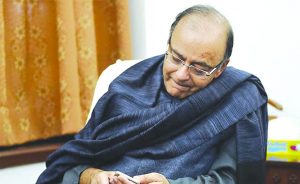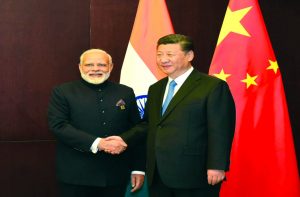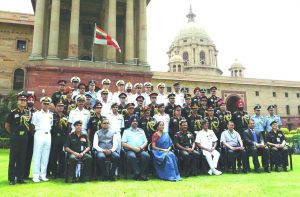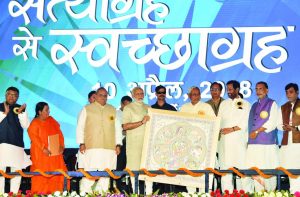Medical Problems
 Finance Minister Arun Jaitley’s medical condition and the post-operative confinement after his kidney transplant will pose some tricky problems for the Modi government. The earlier plan was to get Piyush Goyal to handle the finance ministry in addition to the railways portfolio till Jaitley is fit enough to resume work. The plan now faces a hurdle with Goyal and his wife’s alleged links to Shirdi Industries and other companies becoming a political hot potato with the Opposition crying foul. Moving him to finance will only add to the clamour.
Finance Minister Arun Jaitley’s medical condition and the post-operative confinement after his kidney transplant will pose some tricky problems for the Modi government. The earlier plan was to get Piyush Goyal to handle the finance ministry in addition to the railways portfolio till Jaitley is fit enough to resume work. The plan now faces a hurdle with Goyal and his wife’s alleged links to Shirdi Industries and other companies becoming a political hot potato with the Opposition crying foul. Moving him to finance will only add to the clamour.
The second problem to do with Jaitley’s medical leave is the media. Jaitley’s other responsibility apart from finance and corporate affairs, was managing the media, an area where he is a seasoned practitioner—in fact, his nickname in media circles is Bureau Chief because of his extensive contacts among media owners, editors and “influencers”. One call from him has ended or curtailed many a journalistic career. No one else in the BJP has that kind of network and clout. At a politically pivotal time, that attribute will be sorely missed.
The China Syndrome
 In diplomatic terms, it is referred to as a “reset”. Post-Doklam, relations between the two Asian giants, China and India, had reached a new nadir. Now, both sides seem to be striving for a “reset” in order to ensure that Narendra Modi’s visit to Beijing in June for bilateral talks is not a flop show—a key focus of his meeting with President Xi Jinping is to get Beijing to abandon its objections to India being in the Nuclear Suppliers Group which provides access to the latest technology.
In diplomatic terms, it is referred to as a “reset”. Post-Doklam, relations between the two Asian giants, China and India, had reached a new nadir. Now, both sides seem to be striving for a “reset” in order to ensure that Narendra Modi’s visit to Beijing in June for bilateral talks is not a flop show—a key focus of his meeting with President Xi Jinping is to get Beijing to abandon its objections to India being in the Nuclear Suppliers Group which provides access to the latest technology.
A flurry of high-profile visits will take place before the June meeting. An Indian delegation was at the Boao Forum for Asia—China’s annual Davos-type confab. It included Ratan Tata, FICCI General Secretary Sanjaya Baru and the chief economist of the Aditya Birla Group, Ajit Ranade.
They will be followed by India’s defence minister Nirmala Sitharaman and foreign minister Sushma Swaraj later this month while NITI Aayog vice-chairman Rajiv Kumar will also be in Beijing in May as part of an economic dialogue.
Then, just before the Modi visit, National Security Adviser Ajit Doval will head there for talks with China’s vice-foreign minister—the equivalent of foreign secretary—Kong Xianyou. The two had met in Delhi earlier this month.
Arms and the Men
 In a rare first for India, all defence attaches posted in Indian embassies/high commissions abroad were summoned to Delhi last week. Their brief, as enunciated by defence minister Nirmala Sitharaman at a meeting with all 44 attaches, was to play a pro-active role in changing India’s image as the world’s biggest arms importer to that of a country which is a major manufacturer of military platforms.
In a rare first for India, all defence attaches posted in Indian embassies/high commissions abroad were summoned to Delhi last week. Their brief, as enunciated by defence minister Nirmala Sitharaman at a meeting with all 44 attaches, was to play a pro-active role in changing India’s image as the world’s biggest arms importer to that of a country which is a major manufacturer of military platforms.
The attaches may be based in 44 capitals but are accredited to 95 countries. They were then herded off to the Defence Expo on the outskirts of Chennai to help in selling the theme: “India: The Emerging Defence Manufacturing Hub” where substantial “Made in India” weaponry was on display, from Tejas fighter jets to BrahMos and Aakash missiles, Arjun tanks and warships docked in Chennai harbour. For the defence attaches, it is literally a wake-up call. So far, foreign diplomatic postings for armed forces personnel has been seen as a cushy job, with junkets and receptions. Now, as arms salesmen, they need to polish their act.
Tailpiece
 It’s the David and Goliath syndrome. Last week, on a trip to Bihar, Narendra Modi declared in public that “in the past week, over 8.5 lakh toilets have been constructed in Bihar”. Quick as a flash, RJD leader and Lalu Prasad’s heir apparent, Tejashwi Yadav, tweeted that to achieve that feat, over 85 toilets would need to be built every minute! Fodder for thought.
It’s the David and Goliath syndrome. Last week, on a trip to Bihar, Narendra Modi declared in public that “in the past week, over 8.5 lakh toilets have been constructed in Bihar”. Quick as a flash, RJD leader and Lalu Prasad’s heir apparent, Tejashwi Yadav, tweeted that to achieve that feat, over 85 toilets would need to be built every minute! Fodder for thought.


